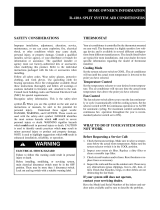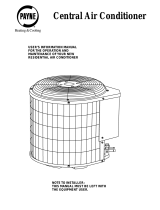
Recogniz_ safety information. This is the safety-alert
symbol/.vX, When you see this symbol in instructions or
manuals, be alert to the potential for personal injury.
Understand the signal words DANGER, WARNING,
CAUTION, and NOTE. These words are used with the
safety-alert symbol. DANGER identifies the most serious
hazards which will result in serious injury or death.
WARNING signifies a hazard which could result in serious
injury or death. CAUTION is used to identify unsafe
practices which may result in minor personal injury or
product and property damage. NOTE is used to highlight
suggestions which will result in enhanced installation,
reliability, or operation.
It is the personal responsibility and obligation of the
customer to contact a qualified installer to ensure that the
installation is adequate and conforms to governing codes
and ordinances.
OPERATING YOUR UNIT
THERMOSTAT
The operation of your air conditioning system is controlled
bythe indoor thermostat. You simply adjust the thermostat
and it maintains the indoor temperature at the level you
select. Most thermostats for air conditioning systems have
three controls. These are the temperature control selector,
FAN switch, and SYSTEM switch.
Sequence of Operation
Cooling Operation:
These units utilize a 2 stage indoor thermostat. With a first
stage call for cooling (Y1), the indoor fan (low stage)
energizes immediately whereas the contactor energizes
after a 5 minute time delay (incase of an initial start up)
starting the compressor (low stage) and the outdoor fan
motor. If the low stage operation cannot satisfy the cooling
demand, the second stage cooling (Y2) energizes
switching the compressor into high stage cooling through
energizing an internal solenoid valve inside the scroll
compressor and switching the indoor fan into high stage.
When second stage cooling is satisfied, Y2 de-energizes
switching the compressor and the indoor fan into low stage
cooling. When the low stage cooling demand is met, Y1
de-energizes shutting the compressor, indoor fan and the
outdoor fan.
Heating Operation:
With a call for heating (W2), the auxiliary electric heater is
energized along with the Indoor blower. If the demand is
not met, W3 is energized incase of staged heating. When
heating demand is satisfied, W3 and W2 sequentially
de-energize along with the indoor fan blower.
Continuous Fan:
With the continuous Indoor fan option selected on the
thermostat, G is continuously energized. The system runs
low stage (Y1) airflow for continuous fan operation.
The temperature control selector is a dial or button(s) that
allows you to establish the degree of temperature that you
wish to maintain for your personal comfort. Some
thermostats possess two temperature control selectors:
one for setting the temperature desired during the cooling
cycle, and one to set the heating operation temperature (if
the accessory electric heater is used).
The FAN switch offers two options for controlling the
blower: AUTO and ON. When set to AUTO, the blower will
run during the time the air conditioner is operating. When
the FAN switch is set at the ON position, the blower will run
continuously.
Typically, the SYSTEM switch on your thermostat offers the
following selections: COOL, OFF, and HEAT. Your
thermostat may also have a fourth selection, AUTO. The
air conditioner will not operate when the SYSTEM switch is
set at the OFF position. With the SYSTEM switch set at
COOL, the cooling section of your comfort system will
operate when the indoor temperature rises above the level
that you wish to maintain. With the SYSTEM switch set at
the HEAT position, the accessory electric heater will
operate automatically whenever the indoor temperature
falls below the level that you have selected.
The AUTO selection found on some thermostats provides
for automatic changeover between cooling and heating
cycles. With the SYSTEM switch set in the AUTO position,
the cooling mode is activated when the indoor temperature
rises above the thermostat cooling temperature setting, or
the heating mode will be activated when the indoor
temperature drops below the thermostat setting for the
heating cycle.
The following are typical conditions that add extra heat
and/or humidity to your home. Your air conditioner will work
longer to keep your home comfortable under these
conditions:
• Entrance doors are frequently opened and closed
• Laundry appliances are being operated
• A shower is running
• More than the usual number of people are present in the
home
• More than the normal number of electric lights are in use
• Drapes are open on the sunny side of the home
Heating Cycle - If you own a packaged air conditioner that
includes electric heat as an accessory, you need to set your
thermostat for heating when it is desired.
With the SYSTEM switch of your indoor thermostat set to
the HEAT position, the heating section of your home
comfort system will operate until room temperature is
raised to the level you have selected. Of course, the
heating unit will have to operate for longer periods to
maintain a comfortable environment on colder days and
nights than on moderate ones.
PERFORMING ROUTINE MAINTENANCE
With the proper maintenance and care, your air conditioner
will operate economically and dependably. Maintenance
can be accomplished easily by referring to the following
directions. However, before performing maintenance
consider these important safety precautions:






